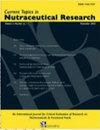沙特阿拉伯南部地区维生素D和钙水平与甲状腺状况的关系
IF 0.4
4区 医学
Q4 NUTRITION & DIETETICS
Current Topics in Nutraceutical Research
Pub Date : 2023-07-07
DOI:10.37290/ctnr2641-452x.21:283-290
引用次数: 0
摘要
甲状腺功能障碍是世界范围内最常见的内分泌疾病。甲状腺激素在维持广泛的代谢稳态方面起着至关重要的作用。除了钙和骨代谢外,维生素D还影响非骨骼活动,包括甲状腺。因此,维生素D缺乏被认为是许多甲状腺功能障碍出现的危险因素。在这项研究中,我们旨在研究维生素D和血清钙水平与甲状腺功能障碍的关系。在这项调查中,对沙特阿拉伯南部地区(阿西尔地区)公共、政府医院实验室和为慢性病患者服务的医疗诊所的2735份(1438名女性和1297名男性)实验室结果进行了一年的筛查。甲状腺功能减退组的女性和男性患者的维生素D水平均显著低于甲状腺功能亢进组和甲状腺功能正常组。血清总钙水平的影响在任何甲状腺功能障碍类别中都不显著。在所有甲状腺状态组中观察到血清总钙水平正常的高患病率。甲状腺功能障碍患者的血清总钙与维生素D和TSH之间的部分相关性表明,维生素D与TSH之间存在显著的负相关性,甲状腺功能减退症患者的血清钙总水平与TSH存在不显著的负相关。然而,在甲状腺功能减退组中,血清总钙与TSH呈负相关,而维生素D与TSH呈正相关。本文章由计算机程序翻译,如有差异,请以英文原文为准。
Association of Vitamin D and Calcium Levels with Thyroid Status in the Southern Region of Saudi Arabia
Thyroid dysfunction is the most prevalent endocrine disorder worldwide. Thyroid hormone has a crucial role in maintaining a wide array of metabolic homeostasis. In addition to calcium and bone metabolism, vitamin D influences nonskeletal activities, including the thyroid gland. Therefore, hypovitaminosis D is considered a risk factor for the emergence of many thyroid dysfunctions. In this investigation, we aimed to investigate the association of vitamin D and serum calcium levels with thyroid dysfunction. In this investigation, 2,735 (1,438 females and 1,297 males) laboratory findings from the public, government hospital laboratories, and medical clinics serving chronic patients in the south region (Asir region) of Saudi Arabia were screened over the course of one year. The vitamin D level was significantly lower in both female and male patients in the hypothyroidism category than in the hyperthyroidism and euthyroidism groups. The influence of total serum calcium level was not significant in any thyroid dysfunction category. A high prevalence of normal levels of total serum calcium was observed in all thyroid status groups. A partial correlation between total serum calcium and vitamin D and TSH among thyroid dysfunction patients demonstrated a significant negative correlation between vitamin D and TSH and a nonsignificant negative correlation between total serum calcium level and TSH among hypothyroidism categories. However, in the hypothyroidism group, total serum calcium demonstrated a negative correlation with TSH, while vitamin D showed a positive correlation with TSH.
求助全文
通过发布文献求助,成功后即可免费获取论文全文。
去求助
来源期刊
CiteScore
1.10
自引率
0.00%
发文量
36
审稿时长
>12 weeks
期刊介绍:
Current Topics in Nutraceutical Research is an international, interdisciplinary broad-based peer reviewed scientific journal for critical evaluation of research on chemistry, biology and therapeutic applications of nutraceuticals and functional foods. The major goal of this journal is to provide peer reviewed unbiased scientific data to the decision makers in the nutraceutical and food industry to help make informed choices about development of new products.
To this end, the journal will publish two types of review articles. First, a review of preclinical research data coming largely from animal, cell culture and other experimental models. Such data will provide basis for future product development and/or human research initiatives. Second, a critical evaluation of current human experimental data to help market and deliver the product for medically proven use. This journal will also serve as a forum for nutritionists, internists, neurologists, psychiatrists, and all those interested in preventive medicine.
The common denominator of all of the topic to be covered by the journal must include nutraceuticals and/functional food. The following is an example of some specific areas that may be of interest to the journal. i) Role of vitamins, minerals, antioxidants and phytonutrients on cardiovascular health, cancer, diabetes, ocular health, mental health, men’s health, women’s health, infant nutrition, ii) Role of herbals on human health, iii) Dietary supplements and sleep, iv) Components of diet that may have beneficial effect on human health, v) regulation of apoptosis and cell viability, vi) Isolation and characterization of bioactive components from functional foods, vii) Nutritional genomics, and viii) Nutritional proteomics.

 求助内容:
求助内容: 应助结果提醒方式:
应助结果提醒方式:


